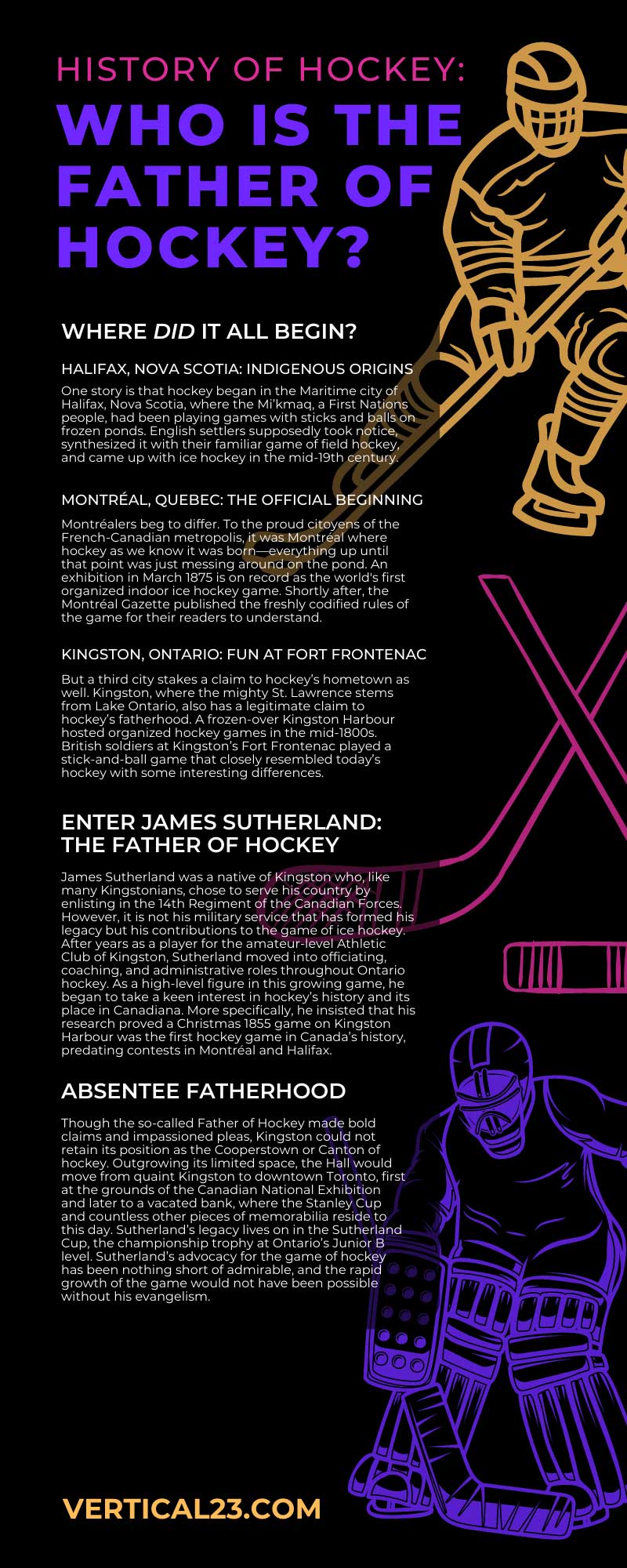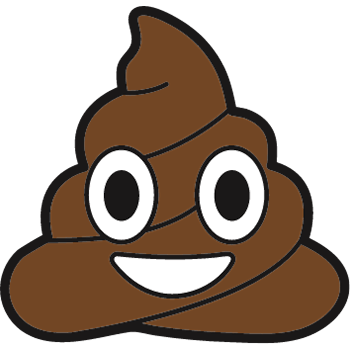Sports form a large part of North America’s cultural landscape. Though it seems as if our favorite teams and the games they play have been around forever, that’s hardly the case. Few of the sports we know and love even predate the American Civil War. Take, for instance, ice hockey. This beloved winter sport of Canada, New England, and the Great Lakes has a timeless charm with its frozen-pond origins and quaint traditions. But have we been shooting and skating since time immemorial? Did the game spring fully formed from a sportsman’s fertile mind? Let’s dive into the long, complicated, and slightly dubious history of hockey: who is the father of hockey?
Where Did It All Begin?
Longtime fans know that hockey is a game full of unwritten rules. As it turns out, it’s a game full of unwritten everything. What ice hockey boasts in excitement, it lacks in fastidious record-keeping. For instance, would you believe the NHL didn’t even begin tracking players’ shot attempts and time on ice until 1997? That means that when we reflect on Wayne Gretzky and his famous quote, “you miss 100 percent of the shots you don’t take,” we have no way of knowing exactly how many shots he did take. Ask three Blackhawks fans what the origin of cheering through the national anthem is, and you’ll get three different responses. Who came up with mocking opposing goalies by simply chanting their name in that familiar singsong cadence? Every fanbase insists they did, but none of them thought to write it down.
With so much mystery in the game’s history, it’s no shock that even ice hockey’s provenance is apocryphal. We know that hockey does not have a “father” like basketball does with its inventor, James Naismith. We also know that it seems to have evolved from similar games in England and Scotland, much as baseball evolved from rounders and cricket—people have been playing stick-and-ball games on the sceptred isle since the days of the Roman Empire.
Here's where it gets confusing. Three different Canadian cities lay claim to being the birthplace of ice hockey as we know it.
Halifax, Nova Scotia: Indigenous Origins
One story is that hockey began in the Maritime city of Halifax, Nova Scotia, where the Mi’kmaq, a First Nations people, had been playing games with sticks and balls on frozen ponds. English settlers supposedly took notice, synthesized it with their familiar game of field hockey, and came up with ice hockey in the mid-19th century. Though Nova Scotia’s capital has always been a bit too small to host an NHL team of its own, Haligonians have been proud to claim the game’s origin.
Montréal, Quebec: The Official Beginning
Montréalers beg to differ. To the proud citoyens of the French-Canadian metropolis, it was Montréal where hockey as we know it was born—everything up until that point was just messing around on the pond. An exhibition in March 1875 is on record as the world's first organized indoor ice hockey game. Shortly after, the Montréal Gazette published the freshly codified rules of the game for their readers to understand. As tired a cliché as it may be, in this city we can honestly say that “the rest was history.” Le club du hockey Canadien—better known as the Montréal Canadiens—took the ice in 1909, eventually bringing the Stanley Cup to the steepled city an unbelievable 24 times. A group of businessmen would found the National Hockey League there in 1917. And it was not until as late as 1989 that the NHL joined the rest of America’s sports leagues by headquartering in midtown Manhattan—the home office remained defiantly Montréalais for as long as it could in its august home along rue Metcalfe.
Kingston, Ontario: Fun at Fort Frontenac
But a third city stakes a claim to hockey’s hometown as well. Kingston, where the mighty St. Lawrence stems from Lake Ontario, also has a legitimate claim to hockey’s fatherhood. A frozen-over Kingston Harbour hosted organized hockey games in the mid-1800s. British soldiers at Kingston’s Fort Frontenac played a stick-and-ball game that closely resembled today’s hockey with some interesting differences. The “point” and “cover-point” players—today’s defensemen—could not skate beyond centre ice. Unlike today’s butterfly goalies, netminders couldn’t fall to their knees to make saves. And if you thought five-on-five play clogged the ice, 1840s Kingston rules featured a rover, a sixth skater who hovered between forward and defense. Kingston is now the home of the major-junior OHL’s Frontenacs, and the city occasionally stages recreations of authentic old-time hockey, square wooden puck and all. They take their claim to hockey’s birthplace seriously, and in an appropriate turn for this longtime military installation and prison town, they’re ready to fight for it. That takes us to the man who goes down in the sport’s murky history as “the Father of Hockey.”
Enter James Sutherland: The Father of Hockey
James Sutherland was a native of Kingston who, like many Kingstonians, chose to serve his country by enlisting in the 14th Regiment of the Canadian Forces. However, it is not his military service that has formed his legacy but his contributions to the game of ice hockey. After years as a player for the amateur-level Athletic Club of Kingston, Sutherland moved into officiating, coaching, and administrative roles throughout Ontario hockey. As a high-level figure in this growing game, he began to take a keen interest in hockey’s history and its place in Canadiana. More specifically, he insisted that his research proved a Christmas 1855 game on Kingston Harbour was the first hockey game in Canada’s history, predating contests in Montréal and Halifax. On this basis, Sutherland believed Kingston was the natural and rightful home for an eventual Hockey Hall of Fame, which would open in Kingston in 1943.
Absentee Fatherhood
Though the so-called Father of Hockey made bold claims and impassioned pleas, Kingston could not retain its position as the Cooperstown or Canton of hockey. Outgrowing its limited space, the Hall would move from quaint Kingston to downtown Toronto, first at the grounds of the Canadian National Exhibition and later to a vacated bank, where the Stanley Cup and countless other pieces of memorabilia reside to this day. Sutherland’s legacy lives on in the Sutherland Cup, the championship trophy at Ontario’s Junior B level. Sutherland’s advocacy for the game of hockey has been nothing short of admirable, and the rapid growth of the game would not have been possible without his evangelism. Still, you won’t find many contemporary chroniclers of the history of hockey who regard Sutherland as the father of hockey. Perhaps he was more like a very supportive uncle.
Confusing and vague as hockey’s history may be, its years of tradition and passion make it irresistible to millions, from Canadian patriots to fans in the Midwestern and Northeastern U.S. to diehards in emerging hockey towns such as Tampa, Nashville, and Raleigh. The only thing more compelling than hockey’s past is its future—namely, trying to predict it. NHL picks from Vertical23 will help you do just that and add a bit more excitement and vested interest in this high-speed, historically rich game that already commands so much attention; however it began.



